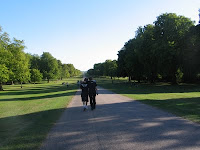 Previously published in the Globe and Mail Life section, August 2007
Previously published in the Globe and Mail Life section, August 2007Did you know that you can find a coach to help you with just about any concern, problem or challenge? Nowadays, sports coaches must share their title with those who have a shingle of their own to hang up, for almost every subject you can think of.
Are you having trouble training your dog? Call a dog coach. S/he will come to your home and for a fee, will teach you and your family all the necessary tools to transform your unwieldy beast into a cooperative and affectionate canine friend. Having trouble in the romance department? A sex coach will be more than happy to teach you and your partner a few strategies to regenerate your faltering love life.
There’s the ever popular fitness coach (or personal trainer) who will meet with you on a regular basis to make sure you are doing those sit-ups and lifting those weights. How about a gardening coach? If you aren’t sure what to do with your yard and don’t know a thing about botany, you can hire a gardener to instruct you from the ground up in what to plant, how to plant it, and what is required to maintain it. Not a bad idea for wannabe green thumbs.
A life coach will help you kick start a new career, get you on track for that much deserved promotion or help you make a life transition that, without guidance, you’d be too afraid to consider. We all need help with our children, don’t we? A parenting coach will be more than happy to advise you on how to raise obedient, confident, and well-mannered youngsters. From toddlers to teenagers, trained specialists will teach you the best approach to negotiating the psychology of just about every age and stage.
My favourite is the organizing coach—the de-clutter guru who comes to your house armed with boxes and garbage bags, and a team of ruthless thrower-outers, to sift through all the extraneous items that are cramping your space. At the end of the session your residence will be pristine and clutter-free—a clean slate which you can begin to refill with new superfluous paraphernalia. But that’s okay, because you can call them back next year to repeat the process.
I don’t begrudge the coaching profession, nor do I judge those who hire specialists to help them learn a new skill. I myself hired a writing coach to help me with my first novel. She gave me invaluable technical advice as well as chapter by chapter feedback. It could be the best money I ever spent on my education.
But I do have a question: Can we not pick up a book or talk to someone we know who has some direct knowledge in the field—at least in some cases? Can we not figure out a fitness plan, or a gardening plan, or a parenting plan on our own? I’m beginning to wonder if we have lost all confidence in our own abilities. Just because we are really, really good at some things does that make us completely ignorant in all other areas? Is time so precious that we have to rely on the advice and skills of others to help us figure out our next move rather than figuring it out ourselves?
Somehow, our parents and grandparents managed to survive in this world without a personal coach to guide them. If our children see us calling on coaches every time we need some help, will they begin to think that all one needs to solve a problem is a phone number and a credit card? This hand-holding approach to self-improvement might save some time, but it can also limit our connection to the community and hamper our resourcefulness. Perhaps we need to stop to consider what our needs truly are.
If there is one area in which humanity could use a coach these days, I think it is for the soul. A “soul coach” could help us find the answers to those big questions: Why are we here? Why are there such inequities in the world? Why do horrible things happen to good, decent people? Why must children suffer? What kind of God would allow such brutality in the world? What is the point…the point of all the struggle, all the misery and all horror?
Many of us are so busy trying to improve ourselves in the most trivial ways—how about trying to improve what lies beyond us, beyond our self-centered reality? I’ve studied a little philosophy, read a book or two about religion, attended church, and pondered these questions for years, but I’ve come no closer to enlightenment. So, I’ve come to the conclusion that I could definitely use a coach for my soul…and perhaps a coach for my spirit too.








